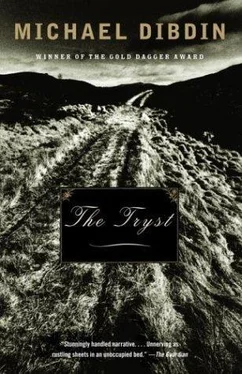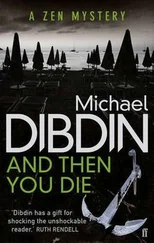Michael Dibdin - The Tryst
Здесь есть возможность читать онлайн «Michael Dibdin - The Tryst» весь текст электронной книги совершенно бесплатно (целиком полную версию без сокращений). В некоторых случаях можно слушать аудио, скачать через торрент в формате fb2 и присутствует краткое содержание. Жанр: Триллер, на английском языке. Описание произведения, (предисловие) а так же отзывы посетителей доступны на портале библиотеки ЛибКат.
- Название:The Tryst
- Автор:
- Жанр:
- Год:неизвестен
- ISBN:нет данных
- Рейтинг книги:4 / 5. Голосов: 1
-
Избранное:Добавить в избранное
- Отзывы:
-
Ваша оценка:
- 80
- 1
- 2
- 3
- 4
- 5
The Tryst: краткое содержание, описание и аннотация
Предлагаем к чтению аннотацию, описание, краткое содержание или предисловие (зависит от того, что написал сам автор книги «The Tryst»). Если вы не нашли необходимую информацию о книге — напишите в комментариях, мы постараемся отыскать её.
The Tryst — читать онлайн бесплатно полную книгу (весь текст) целиком
Ниже представлен текст книги, разбитый по страницам. Система сохранения места последней прочитанной страницы, позволяет с удобством читать онлайн бесплатно книгу «The Tryst», без необходимости каждый раз заново искать на чём Вы остановились. Поставьте закладку, и сможете в любой момент перейти на страницу, на которой закончили чтение.
Интервал:
Закладка:
Michael Dibdin
The Tryst
Every crime has something of the dream about it. Crimes determined to take place engender all they need: victims, circumstances, pretexts, opportunities.
PAUL VALERY1
‘One of my patients thinks somebody’s trying to kill him.’
She had meant to sound light and casual, but the words gushed out, breathless and urgent, betraying her feelings, her emotion, her involvement. It had been madness to mention the boy.
Or perhaps I’m imagining it, she thought. Perhaps he’s noticed nothing.
Her husband speared one of the rectangles into which he had previously divided his slice of quiche, dredged it thickly in mayonnaise and hoisted it into his mouth. After chewing conscientiously for a moment or two, he glanced over at his wife.
‘Isn’t that fairly … normal?’
It was a trap, of course. If she took him literally, he would claim that he’d been joking; if she treated it as an example of the pawky humour he was so proud of, he would ask pointedly what was funny about someone in fear of his life.
‘A normal delusion, you mean?’ Aileen asked as she refilled their glasses with wine.
Her husband paused judiciously.
‘Well, I take it that the person in question …’
‘His name’s Gary. Do finish the quiche if you can.’
She watched as Douglas lifted the remaining segment of quiche to his plate, then thrust his knife deep into the jar of mayonnaise.
‘I take it that he is mad,’ he concluded.
‘ “Mad” is no longer a recognized psychiatric category,’ his wife replied primly.
‘Well, psychosocially disadvantaged, or whatever the current jargon is. Observing non-normative behavioural criteria, into a whole other perceptual thing, marching to the beat of a different …’
‘He’s suffering from depression following an extremely stressful experience,’ Aileen went on even more stiffly. She realized too late that she had been outmanoeuvred, boxed into a corner, a po-faced Aunt Sally glaring disapprovingly at her husband’s puckish jests.
Douglas Macklin mopped up the remaining mayonnaise with his last soggy piece of quiche.
‘What happened to him?’
‘He witnessed a murder, actually.’
For a moment, her husband looked genuinely interested.
‘Really?’
‘Well, he found the body, anyway.’
She knew the risk she was taking, but it made no difference, not where the boy was concerned. The pressure of unspoken words was too great to be denied.
‘His social worker referred him as query schizophrenic, but …’
‘Now hang on a moment,’ her husband interrupted with a frown. ‘Schizophrenia. What is that, exactly?’
‘Sorry?’
Douglas Macklin repeated his question.
‘Oh, come on!’ his wife urged with a laugh that sounded almost natural. ‘Have you forgotten all those long discussions we used to have about it?’
Forgetting, as she well knew, was not something Douglas Macklin permitted himself to do.
‘About what ?’ he hedged.
‘About schizophrenia! That’s what we’re talking about, isn’t it?’
‘I wasn’t absolutely sure what you were talking about, to be perfectly honest. That’s why I asked the question.’
Aileen locked her teeth together. She had already said far too much. Yes, it had been madness to think that she could afford the luxury of discussing this, of all cases, with her husband, of all people.
‘As to those discussions, I haven’t forgotten them,’ Douglas went on with renewed energy. ‘Although it must be, what, almost twenty years ago now?’
He paused for a reminiscent smile.
‘I seem to remember you arguing that madness is just a strategy, a way of coming to terms with a crazy world. That the people we call mad are really too sane, so much so that the rest of us drive them mad. Tell me, do you still subscribe to that view? It’s no longer quite so fashionable as it used to be, I believe.’
He spoiled things slightly by helping himself to more mayonnaise, which he ate with a piece of bread, ignoring the salad she had prepared. A parsimonious lower-middle-class upbringing in Aberdeen had left Douglas Macklin with a perpetually unsatisfied child inside, subject to indiscriminate greed that had no effect on his scrawny figure. Left to his own devices, Aileen knew, he would eat standing up at the kitchen counter, stuffing himself with lard sandwiches and sticky buns, washed down with mugs of hot sweet tea.
‘Of course!’ she snapped. ‘You know me. I just parrot whatever idea is currently fashionable.’
She checked herself there, but it was too late.
‘I didn’t say that,’ her husband recited slowly, as though dictating a letter to a not-very-bright secretary. ‘I was merely asking about your views on a subject of professional interest. What’s wrong with that?’
She said nothing.
‘Honestly, Aileen, I’m beginning to worry about you, you know. You seem to get things completely out of proportion sometimes. To overreact grotesquely.’
He completed his triumph with a look both solicitous and critical.
There had been a time, earlier in their marriage, when Aileen had thought of the contests which took place at their dinner table every evening as a kind of psychological chess. She had soon come to realize that this image was totally inadequate. It was more like mud-wrestling than chess; intimate, bruising, slimy, devious and degrading. Facing her husband across the ruins of yet another meal, she asked herself once again how she came to be there, what it was that had brought her to that point. They had met in 1968 at the University of Sussex, where Douglas was finishing a BSc in what he liked to describe as ‘the chemical soup we carry round in our skulls’. Aileen, too, was studying the brain, although from a different direction. She could have done her degree in psychology somewhere safe like Exeter, as her parents had wished, but the much-publicized high jinks of the glittery Sussex students tempted her to apply there. Eight months later, she was depressed, lonely, overworked, underfed and homesick. Out of season, Brighton proved to be cold and cheerless. The flat she was sharing with two other girls was smelly and damp, in particular the room which she had been allocated, and to make matters worse, her social life obstinately refused to take off. This was the more unbearable in that her flatmates were constantly being called for, taken out and brought back at all hours, or even not till the next morning. Aileen was cast in the role of housekeeper, taking messages and passing on directions, handing over keys and notes, making excuses, telling lies and answering the telephone, which never rang for her. Such invitations as she did receive were of a kind she could hardly flaunt before the Londoners, such as her tutor’s Saturday morning ‘at home’. Nevertheless it was there, amidst saucers of over-salted peanuts, thimbles of Cyprus sherry and sterile acres of strenuously intelligent conversation, that Aileen was introduced to Douglas Macklin.
Aileen had actually felt quite excited to be at the reception, until it dawned on her that attendance was virtually obligatory and everyone else was wondering how soon they could decently leave. The realization that she was the only person present who didn’t have something more interesting to do brought on a crippling attack of self-pity, and so she felt quite grateful to the skinny sandy-haired Scotsman who talked her ear off about his work for the best part of an hour. When they said goodbye, he noted her address and phone number as impersonally as an estate agent. She was therefore quite surprised to be rung a few days later and asked out to the cinema. The following week Douglas invited her to a restaurant whose pretensions were reflected in the oppressive furnishings and overbearing service rather than the food. Afterwards they went to a pub to unwind, and when they reached the flat Aileen invited him in for coffee. When her trendy flatmates burst in with the usual admiring crew in tow, Aileen abruptly decided that she would not be sleeping alone that night. Although not technically a virgin, she had never been to bed with a man before, but it proved to be remarkably similar to what she had imagined. Douglas monopolized the action much as he had at her tutor’s party, and as on that occasion Aileen was neither overwhelmed nor disappointed, merely grateful for the attention. When she got up to make tea in the morning, she knew that the other girls would never be able to impose on her in quite the same way again.
Читать дальшеИнтервал:
Закладка:
Похожие книги на «The Tryst»
Представляем Вашему вниманию похожие книги на «The Tryst» списком для выбора. Мы отобрали схожую по названию и смыслу литературу в надежде предоставить читателям больше вариантов отыскать новые, интересные, ещё непрочитанные произведения.
Обсуждение, отзывы о книге «The Tryst» и просто собственные мнения читателей. Оставьте ваши комментарии, напишите, что Вы думаете о произведении, его смысле или главных героях. Укажите что конкретно понравилось, а что нет, и почему Вы так считаете.












